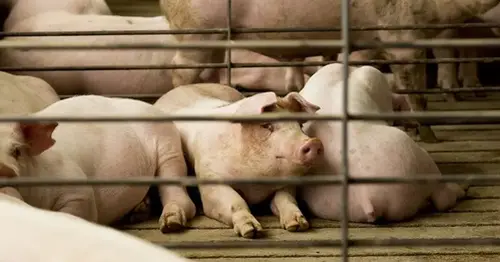
Supreme Court upholds California animal welfare law on pig farms
WASHINGTON — The Supreme Court on Thursday rejected a challenge to a California animal welfare law that would ban the sale of pork derived from breeding pigs housed in confined spaces.
In a fractured ruling that divided the court along nonideological lines, the majority said the measure, known as Proposition 12, did not unlawfully regulate pork produced in other states, as the challengers claimed. The law is on hold as part of separate litigation in state court.
Five justices wrote their own opinions, showing that there was considerable dissension over what legal rationale to adopt. While five justices said the lawsuit should be dismissed, four said it should have been allowed to move forward.
The ruling, written by Justice Neil Gorsuch, protects the authority of states to enact laws to protect the health and welfare of the public even if the measures have impacts out of state. Groups that back California had warned that a broad ruling against it could limit states’ authority to enact laws about a wide variety of issues, including measures to address climate change, such as by efforts to reduce reliance on fossil fuels by promoting renewable energy.
"While the Constitution addresses many weighty issues, the type of pork chops California merchants may sell is not on that list," Gorsuch said.
While it is long established that states cannot use their laws to discriminate against out-of-state interests, the California law is focused on regulating the sale of pork within its own borders, he said.
Scott Hays, the president of the National Pork Producers Council, which challenged the measure, said in a statement: "We are very disappointed with the Supreme Court’s opinion. Allowing state overreach will increase prices for consumers and drive small farms out of business, leading to more consolidation."
Californians approved Proposition 12 in 2018 with nearly 63% of the vote, a margin of more than 3 million votes. The measure would require that sows have at least 24 square feet of space in their enclosures, allowing them to turn around. The state’s lawyers pointed out in court papers that voters were told the measure, which is not in effect, would most likely increase the price of pork but provide for more humane living conditions for pigs and potentially reduce the risk of foodborne illnesses.
The National Pork Producers Council, which represents the pork industry, and the American Farm Bureau Federation, which represents farming interests, sued in 2019, saying the measure violates a provision of the Constitution called the commerce clause, which has been interpreted to bar states from interfering with interstate commerce.
The challengers said the measure would impermissibly interfere with interstate commerce in part because almost all of the pork sold in California is produced out of state by farmers who would not currently be in compliance. The law would also impose an excessive burden on out-of-state entities without having a clear in-state benefit, they argue. As a result, they say, the law has an unlawfully broad extraterritorial effect.
Lower courts upheld the measure, prompting the challengers to turn to the Supreme Court, which has a 6-3 conservative majority.
Gorsuch was joined in the majority by fellow conservatives Clarence Thomas and Amy Coney Barrett and liberals Elena Kagan and Sonia Sotomayor.
In dissent, Chief Justice John Roberts said he would have revived the lawsuit because the challengers "have plausibly alleged a substantial burden against interstate commerce."
Conservative justices Samuel Alito and Brett Kavanaugh also dissented, as did liberal Justice Ketanji Brown Jackson.
Other states have passed similar laws based on moral concerns, including nine that ban products tested on animals and eight that ban eggs produced by caged hens, lawyers for the Humane Society of the United States have pointed out. Nine states also ban sales of fetal tissue from aborted fetuses, according to court filings.
The groups challenging the California law said in court papers that Proposition 12 “will transform the pork industry nationwide” because currently nearly all farmers keep sows in pens that do not comply with the law.
That view was contested by California and its allies, including meat producer Perdue Premium Meat Co., which filed a brief saying its Niman Ranch brand has for years been raising hogs that would have been in compliance with Proposition 12’s requirements.
California Attorney General Rob Bonta, in charge of defending the law, said in court papers that the measure was valid under the commerce clause because it was not aimed at benefiting California producers over out-of-state competitors.
In a statement Thursday, Bonta said the ruling “means that California can continue to have in place humane and commonsense standards, instead of the extreme confinement pushed by some pork producers.” He added that the Supreme Court affirmed “states’ important role in regulating goods sold within their borders.”






